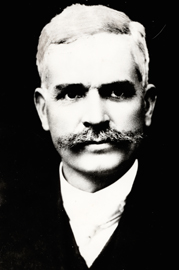
Andrew Fisher was born in Orr's Land, Crosshouse on 22 August 1862, the second of a family of six sons and a daughter born to Robert Fisher and Jane Garven.
Aged 10, he joined his father down the local pits and worked there for nine years. Robert Fisher was a founder member of the Crosshouse Co-operative Society, founded in the year of Andrew's birth. Andrew had no education beyond the basic elementary level, but he was an avid reader and acquired a level of literacy and rhetoric which led him, in his teens, into the political arena.
Aged 17, he was appointed district secretary of the Ayrshire branch of the Miners Union. As such, he played a major role in the bitter miner's strike of 1881, for which he was blacklisted. Unable to obtain work, he used enforced leisure to further his education. Eventually he got work, but was again blacklisted in 1885 and decided that there was no future for him in Scotland.
In June 1885 he emigrated to Australia and settled in Queensland where he obtained employment in the coalmines of Gympie. In his spare time he studied economics and social science and worked as a union leader. In 1893 he was elected to the Queensland Legislative Assembly as a member for Gympie. In December 1899 Queensland had a Labour government for all of several days and in the short-lived Dawson administration Andrew Fisher was Secretary for Railways and Public Works. In April 1904 Fisher became Minister for Trade and Customs.
In 1907, J. C. Watson resigned the leadership of the party and Fisher was elected in his place. In November 1908 he withdrew the support he had been giving to Alfred Deakin's administration, and became Prime Minister and Treasurer. He was displaced in June 1909, but at the general election of April 1910 Labour secured a majority of the House and Fisher returned to power as Prime Minister and Treasurer.
In October 1915 Fisher resigned as Prime Minister, being succeeded by W. M. Hughes. He now became Australian High Commissioner in London, a position he held until 1921. After a visit to Australia he returned to Britain and in 1923 tried to get adopted as Labour candidate for the Kilmarnock Burghs in the general election of 1924. He was rejected by the constituency selection committee because his views were not in conformity with the programme and policy of the National Labour Party. He retired to London where he died on 22 October 1928. He was survived by his wife Margaret, five sons and a daughter.